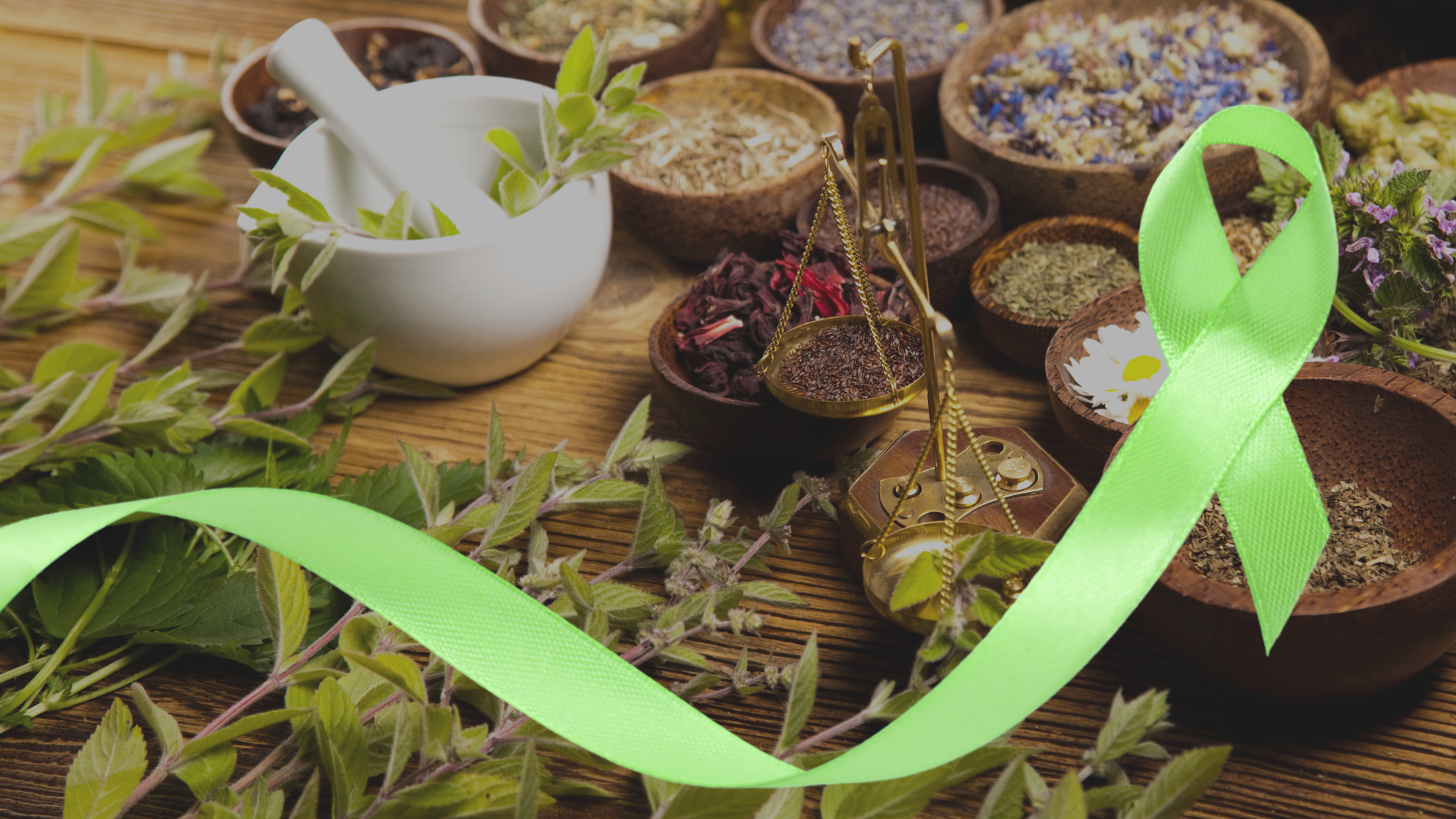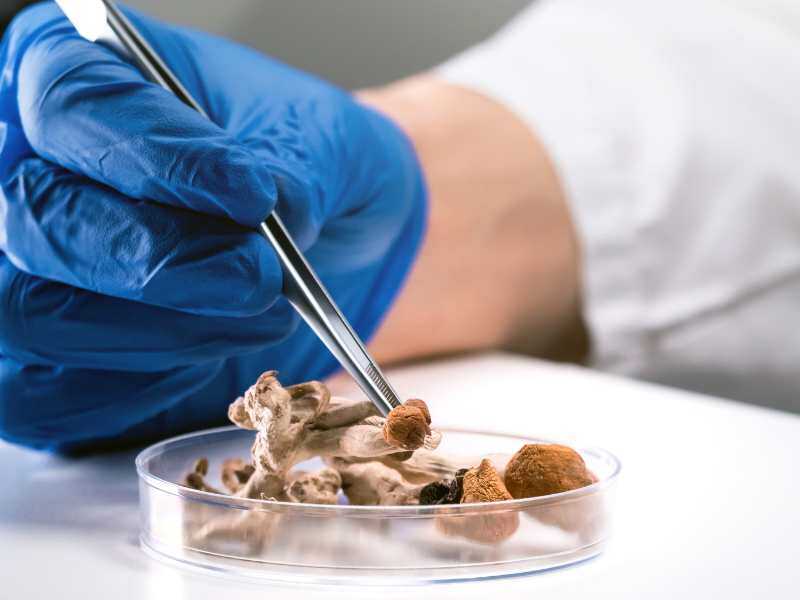As the flowers bloom and the days lengthen, May heralds not only the onset of spring but also an important annual observance: Mental Health Awareness Month. This month serves as a reminder to prioritize our mental well-being, break the stigma surrounding mental health issues, and learn about natural remedies that can support our minds.
While traditional treatments like therapy and medication remain vital, herbal remedies offer a complementary and natural way to enhance mental well-being.
In this blog, we take a closer look at 5 powerful herbs that have potential benefits in boosting mental health. St. John’s wort, ashwagandha, ginkgo, valerian, and German chamomile are herbs that can easily be incorporated into your daily life to nurture a healthier mind. Read on to get the inside scoop on each of these amazing herbs!
St. John’s Wort
St. John's wort Hypericum perforatum is a flowering plant native to Europe, but it's also found in other parts of the world, including North America and Asia. The plant was named after St. John the Baptist, as it bloomed around the time of the feast of St. John the Baptist in late June. Historically, St. John’s wort has been used for its medicinal properties and was used to treat a variety of conditions, including kidney and lung ailments, and to aid wound healing. In recent years, it has gained popularity as a natural remedy for various other health issues, particularly those related to mental well-being.1
A 2022 study published in the Cureus Journal of Medical Science compared the efficacy of St. John’s wort versus placebo pills and some selective serotonin reuptake inhibitors (SSRIs), particularly fluoxetine for the treatment of depression. It was shown to be comparable, if not more efficacious, than both the placebo and most standard SSRIs.
The popular herb has also been thought to support healthy sleep, which in turn can support anxiety and depression relief. A 2007 study in Planta Medica suggests that St. John's wort does have therapeutic potential in the management of sleep deprivation-induced anxiety-like behavior.
It's important to note that while St. John's wort is generally considered safe for short-term use in recommended doses, it can interact with certain medications and may cause side effects in some individuals. Always consult with a healthcare professional before incorporating it into your routine.
Ashwagandha
Ashwagandha Withania somnifera is a powerful adaptogenic herb that has been used for centuries in traditional Ayurvedic medicine to promote overall health and well-being. Known as "Indian ginseng" or "Indian winter cherry," ashwagandha offers a wide range of potential benefits for mental health2.
The National Institutes of Health Office of Dietary Supplements reports that results from several clinical trials suggest ashwagandha extracts may help reduce stress and anxiety. It’s an adaptogen, which means it can help regulate the body's stress response by lowering levels of cortisol, the primary stress hormone. By promoting a sense of calmness and relaxation, ashwagandha can help reduce feelings of anxiety and improve resilience to stressors.3
In addition to supporting stress, a review of five clinical studies found evidence that ashwagandha may improve cognitive functioning in certain populations, including older adults with mild cognitive impairment and adults with schizophrenia, schizoaffective disorder, or bipolar disorder.
Ginkgo
Ginkgo Ginkgo biloba is known as the go-to herb for memory support. It is derived from the resilient Ginkgo tree, which delivers both leaves and seeds that offer a range of benefits and can help support healthy cognitive functions.
Ginkgo biloba is a medicinal herb that has been used as a traditional Chinese medicine for several thousand years. Many clinical studies have been conducted to prove its efficacy in support of memory and overall cognitive function. A 2021 study in the American Journal of Translational Research supported these claims by showing that ginkgo can increase neurogenesis, the growth and development of nervous tissue. Neurogenesis is thought to be linked to memory improvement, reduction of anxiety and depression, and even the slowing of the development of dementia and Alzheimer’s disease.
Valerian
Another herb that boasts various properties that improve mental well-being is Valerian Valeriana officinalis. This soothing herb is renowned for promoting peaceful relaxation and normal sleep patterns in healthy adults. It also encourages a healthy, calm, and relaxed mood.
This perennial plant is native to Europe and Asia and naturalized in North America. Valerian is a common ingredient in products promoted as mild sedatives and sleep aids for nervous tension and insomnia.4 As shown in a study in the Journal of Traditional and Complementary Medicine, it is often used as a muscle relaxant, which can lead to a more relaxed and healthy mental state.
Studies have shown that Sleep problems are often associated with various comorbidities, including anxiety and depression. Valerian could be a safe and effective herb to promote sleep and prevent many of the associated disorders that come with insomnia.5
German Chamomile
German chamomile Matricaria recutita is one of the most popular ingredients in herbal teas and makes a delicious evening nightcap for a restful night’s sleep. But this beloved herb can also help uplift your mood.
Chamomile has been found to possess ingredients that counteract certain neuropeptides and lower cortisol levels that are thought to contribute to anxiety, depression, and chronic stress. Reports have suggested that flavonoid components in chamomile can change the activity of neurotransmitters such as serotonin and dopamine, which play a role in mood regulation.6
Drinking chamomile tea regularly or using chamomile essential oil in aromatherapy can help calm the mind, soothe frazzled nerves, and support better sleep, all of which can boost your overall mental health.
It's important to note that while St. John's wort, ashwagandha, ginkgo, valerian, and German chamomile are generally considered safe for short-term use in recommended doses, they can interact with certain medications and may cause side effects in some individuals. Always consult a healthcare professional before incorporating a new herbal remedy into your routine.
Interested in learning more about herbal remedies to support wellness, address specific wellness challenges, and enhance the optimal function of the body? Explore ACHS’ full range of Herbal Medicine Programs!
Disclaimer:
This content is for educational purposes only and is not intended to be medical advice. Always use herbs and essential oils with caution and keep out of reach of children. Use particular caution when pregnant or nursing. Always check contraindications and think safety first! The statements herein have not been evaluated by the FDA. Products are not intended to diagnose, treat, cure, or prevent disease.
Sources:
- National Center for Complementary and Integrative Health. St. John's Wort | NCCIH. National Center for Complementary and Integrative Health. Retrieved April 9, 2024, from https://www.nccih.nih.gov/health/st-johns-wort
- Singh, N., Bhalla, M., de Jager, P., & Gilca, M. (2011). An Overview on Ashwagandha: A Rasayana (Rejuvenator) of Ayurveda. African Journal of Traditional, Complementary, and Alternative Medicines, 8(5), 208-213. https://www.ncbi.nlm.nih.gov/pmc/articles/PMC3252722/#:~:text=Classical%20Uses%20of%20Ashwagandha,been%20used%20as%20a%20Rasayana
- NIH Office of Dietary Supplements. (2023, October 24). Ashwagandha: Is it helpful for stress, anxiety, or sleep? NIH Office of Dietary Supplements. Retrieved April 9, 2024, from https://ods.od.nih.gov/factsheets/Ashwagandha-HealthProfessional/
- NIH Office of Dietary Supplements. (2013, March 15). Valerian - Health Professional Fact Sheet. NIH Office of Dietary Supplements. Retrieved April 9, 2024, from https://ods.od.nih.gov/factsheets/Valerian-HealthProfessional/
- Shinjyo, N., Waddell, G., & Green, J. (2020, October 21). Valerian Root in Treating Sleep Problems and Associated Disorders—A Systematic Review and Meta-Analysis. NCBI. Retrieved April 9, 2024, from https://www.ncbi.nlm.nih.gov/pmc/articles/PMC7585905/
- Sah, A., Naseef, P. P., Kuruniyan, M. S., Jain, G. K., Zakir, F., & Aggarwal, G. (2022, October 19). A Comprehensive Study of Therapeutic Applications of Chamomile. NCBI. Retrieved April 9, 2024, from https://www.ncbi.nlm.nih.gov/pmc/articles/PMC9611340/





